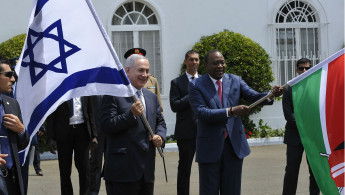Israel gets boost in bid for African Union status
Israeli Prime Minister Binyamin Netanyahu has embarked on a tour of Africa this week, hoping to further the country's influence in the continent.
A meeting between Netanyahu and Uganda's leader proved embarrasing when President Yoweri Museveni repeatedly referred to Israel as "Palestine".
Yet a visit to one of the continent's powerhouses went off much smoother.
Ethiopia looks set to back Israel in its bid to obtain "observer status" at the African Union.
"Israel is working very hard in many African countries. There is no reason to deny this observer position to Israel," said Ethiopia's Prime Minister Hailemariam Desalegn.
Observer status would allow Israel to follow proceedings and address at African Union meetings. Israel had been an observer at the AU's predecessor organisation but its status was not renewed when the new body was formed in 2002.
After years of waning influence in Africa, a link to the 54-member organisation would provide a major diplomatic boost for Israel in the continent.
Sympathy for Palestinians plight has been strong in Africa, with many comparing the struggle against apartheid in South Africa to their struggle.
Palestinian President Mahmoud Abbas has used his country's AU observer status since 2013 to attend AU summits, deliver addresses and shore up diplomatic support against Israel.
Speaking in Addis Ababa, Netanyahu bemoaned the "gap between what is happening in practice... and in multilateral institutions".
"Africa for us is a major strategic effort," he said, repeating a mantra heard in Uganda, Kenya and Rwanda in recent days.
"All African countries can benefit from renewed cooperation with Israel," he said. "Israel is coming back to Africa."
Relations between Africa and Israel have been strained over the years. In the 1960s the Arab-Israeli conflict drove a wedge between African countries - many of which were embroiled in liberation struggles - and Israel.
Later, wars between Israel and Arab countries led North African nations to urge sub-Saharan states to cut ties with Israel, which many did.
Much of Libya's foreign policy efforts involved convincing African nations to end diplomatic relations with Israel.
Israel's close relationship with South Africa's apartheid regime also did much to sour relationships.
Hailemariam said differences can be overcome "by engagement not isolation".
"Israel needs to come to Africa and we need to engage with Israel," he said.
Agencies contributed to the story.





 Follow the Middle East's top stories in English at The New Arab on Google News
Follow the Middle East's top stories in English at The New Arab on Google News


